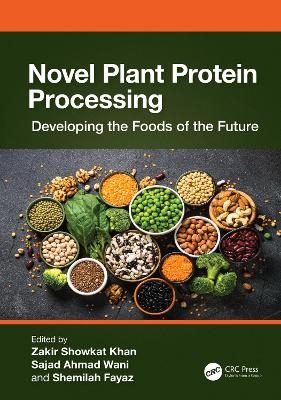
Novel Plant Protein Processing
CRC Press (Verlag)
978-1-032-43816-0 (ISBN)
Proteins serve as an important nutritional as well as structural component of foods. Not only do they provide an array of amino acids necessary for maintaining human health but also act as thickening, stabilizing, emulsifying, foaming, gelling, and binding agents. The ability of a protein to possess and demonstrate such unique functional properties depends largely on its inherent structure, configuration, and how they interact with other food constituents, like, polysaccharides, lipids, and polyphenolic compounds. Proteins from animal sources have superior functionality, higher digestibility, and lower anti-nutrient components than plant proteins. However, consumer preferences are evolving worldwide for ethically and sustainably sourced, clean, cruelty-free, vegan or vegetarian plant-based food products. Unlike proteins from animal sources, plant proteins are more versatile, religiously, and culturally acceptable among vegetarian and vegan consumers and associated with lower food processing waste, water, and soil requirement.
Thus, the processing and utilization of plant proteins have gained worldwide attention and as such numerous scientific studies are focusing on enhancing the utilization of plant proteins in food and pharmaceutical products through various processing and modification techniques to improve their techno-functional properties, bioactivity, bioavailability, and digestibility. Novel Plant Protein Processing: Developing the Foods of the Future presents a roadmap for plant protein science, and technology which will focus on plant protein ingredient development, plant protein modification, and the creation of plant protein-based novel foods.
Key Features:
Includes complete information about novel plant protein processing for use as future foods
Presents a roadmap to upscale the meat analog technological processes
Discusses marketing limitations of plant based proteins and future opportunities
This book highlights the important scientific, technological advancements that are being deployed in the future foods using plant proteins, concerns, opportunities, and challenges, and, as an alternative to maintaining a healthy and sustainable modern food supply. It covers the most recent research related to the plant protein-based future foods which include their extraction, isolation, modification, characterization, development, and final applications. It also covers the formulation and challenges: emphasis on the modification for a specific use, legal aspects, business perspective, and future challenges. This book is useful for researchers, readers, scientists, and industrial people to find information easily.
Zakir Showkat khan is currently working as Assistant Professor TEQIP III in the Department of Food Technology, Islamic University of Science and Technology, Awantipora, J&K, India. He has completed his Master’s Degree in Food Technology from Sant Longowal Institute of Engineering and Technology, Punjab, India, and currently pursuing Ph.D. from Guru Nanak Dev University. Dr. Sajad Ahmad Wani is currently working as D.S. Kothari Post-doctoral fellow in the Department of Food Science and Technology, SKUAST-Kashmir, J&K, India. He has completed his Masters Degree in Food Technology from IUST, Awantipora, J&K, India and PhD from Sant Longowal Institute of Engineering and Technology, Punjab, India. Qualified National Eligibility Test (2015) (NET) conducted by Indian Council of Agricultural Research (ICAR) in Dec 2015. He has published more than 40 research/review articles, 10 book chapters and 7 books. Shemilah Fayaz is currently working as Assistant Professor TEQIP III in the Department of Food Technology, Islamic University of Science and Technology, Awantipora, J&K, India. She has completed his Master’s Degree in Food Technology from National Dairy Research Institute, Karnal, India, and currently pursuing Ph.D. from Guru Nanak Dev University.
Preface. About the Editors. List of Contributors. Introduction to Plant Protein-Based Future Foods. Challenges in Designing of Plant Protein-Based Future Foods. Modification Methods of Plant-Based Proteins: An Overview. Biological Modification of Plant-Based Proteins. Thermal Modification of Plant-Based Proteins. Ultrasonication-Assisted Modification of Plant-Based Proteins. High-Pressure Processing of Plant-Based Proteins. Pulsed Electric Field Modifications of Plant-Based Proteins. Cold Atmospheric Plasma Processing of Plant-Based Proteins. Chemical Modification of Plant Proteins. Processing Techniques for Scaling Up of Modified Plant Proteins. Applications of Modified Plant Protein-Based Future Foods. Packaging: A Legal Aspect of Plant-Based Protein. Plant Protein-Based Foods, Trend from a Business Perspective: Market, Consumers’ Challenges, and Opportunities in Future. Index.
| Erscheinungsdatum | 03.01.2024 |
|---|---|
| Zusatzinfo | 29 Tables, black and white; 40 Line drawings, black and white; 15 Halftones, black and white; 55 Illustrations, black and white |
| Verlagsort | London |
| Sprache | englisch |
| Maße | 178 x 254 mm |
| Gewicht | 453 g |
| Themenwelt | Naturwissenschaften ► Biologie ► Biochemie |
| Technik ► Lebensmitteltechnologie | |
| ISBN-10 | 1-032-43816-9 / 1032438169 |
| ISBN-13 | 978-1-032-43816-0 / 9781032438160 |
| Zustand | Neuware |
| Informationen gemäß Produktsicherheitsverordnung (GPSR) | |
| Haben Sie eine Frage zum Produkt? |
aus dem Bereich


